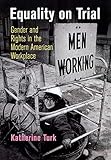Equality on Trial : Gender and Rights in the Modern American Workplace / Katherine Turk.
Material type: TextSeries: Politics and Culture in Modern AmericaPublisher: Philadelphia : University of Pennsylvania Press, [2016]Copyright date: ©2016Description: 1 online resource (296 p.) : 11 illusContent type:
TextSeries: Politics and Culture in Modern AmericaPublisher: Philadelphia : University of Pennsylvania Press, [2016]Copyright date: ©2016Description: 1 online resource (296 p.) : 11 illusContent type: - 9780812248203
- 9780812292831
- Sex discrimination against women -- Law and legislation -- United States
- Sex discrimination against women -- United States -- History
- Sex discrimination in employment -- Law and legislation -- United States
- Sex discrimination in employment -- United States -- History
- HISTORY / United States / 20th Century
- American History
- American Studies
- Gender Studies
- Political Science
- Public Policy
- Women's Studies
- 331.4/1330973 23
- KF3467
- online - DeGruyter
- Issued also in print.
| Item type | Current library | Call number | URL | Status | Notes | Barcode | |
|---|---|---|---|---|---|---|---|
 eBook
eBook
|
Biblioteca "Angelicum" Pont. Univ. S.Tommaso d'Aquino Nuvola online | online - DeGruyter (Browse shelf(Opens below)) | Online access | Not for loan (Accesso limitato) | Accesso per gli utenti autorizzati / Access for authorized users | (dgr)9780812292831 |
Frontmatter -- Contents -- Introduction: Notions of Sex Equality -- Chapter 1. Defining Sex Discrimination -- Chapter 2. Class and Class Action -- Chapter 3. Feminism and Workplace Fairness -- Chapter 4. Reevaluating Women's Work -- Chapter 5. Sex Equality and the Service Sector -- Chapter 6. A Man's World, but Only for Some -- Chapter 7. Opting Out or Buying In -- Conclusion. Illusions of Sex Equality -- List of Abbreviations -- Notes -- Index -- Acknowledgments
restricted access online access with authorization star
http://purl.org/coar/access_right/c_16ec
In 1964, as part of its landmark Civil Rights Act, Congress outlawed workplace discrimination on the basis of such personal attributes as sex, race, and religion. This provision, known as Title VII, laid a new legal foundation for women's rights at work. Though President Kennedy and other lawmakers expressed high hopes for Title VII, early attempts to enforce it were inconsistent. In the absence of a consensus definition of sex equality in the law or society, Title VII's practical meaning was far from certain.The first history to foreground Title VII's sex provision, Equality on Trial examines how the law's initial promise inspired a generation of Americans to dispatch expansive notions of sex equality. Imagining new solidarities and building a broad class politics, these workers and activists engaged Title VII to generate a pivotal battle over the terms of democracy and the role of the state in all labor relationships. But the law's ambiguity also allowed for narrow conceptions of sex equality to take hold. Conservatives found ways to bend Title VII's possible meanings to their benefit, discovering that a narrow definition of sex equality allowed businesses to comply with the law without transforming basic workplace structures or ceding power to workers. These contests to fix the meaning of sex equality ultimately laid the legal and cultural foundation for the neoliberal work regimes that enabled some women to break the glass ceiling as employers lowered the floor for everyone else.Synthesizing the histories of work, social movements, and civil rights in the postwar United States, Equality on Trial recovers the range of protagonists whose struggles forged the contemporary meanings of feminism, fairness, and labor rights.
Issued also in print.
Mode of access: Internet via World Wide Web.
In English.
Description based on online resource; title from PDF title page (publisher's Web site, viewed 30. Aug 2021)


